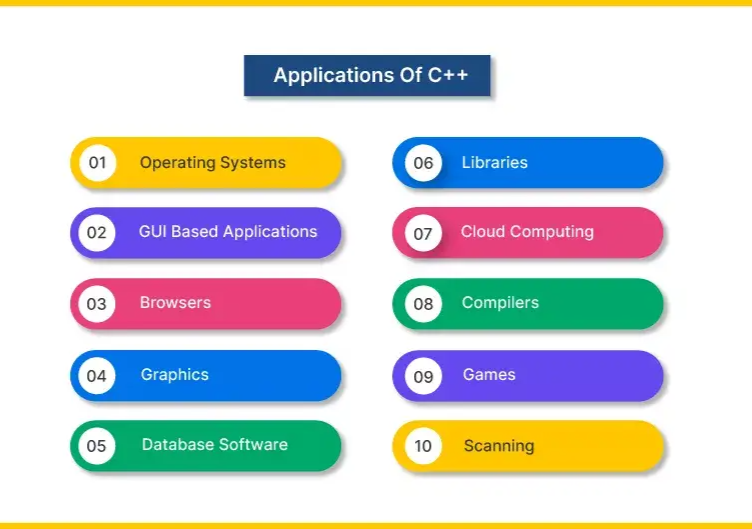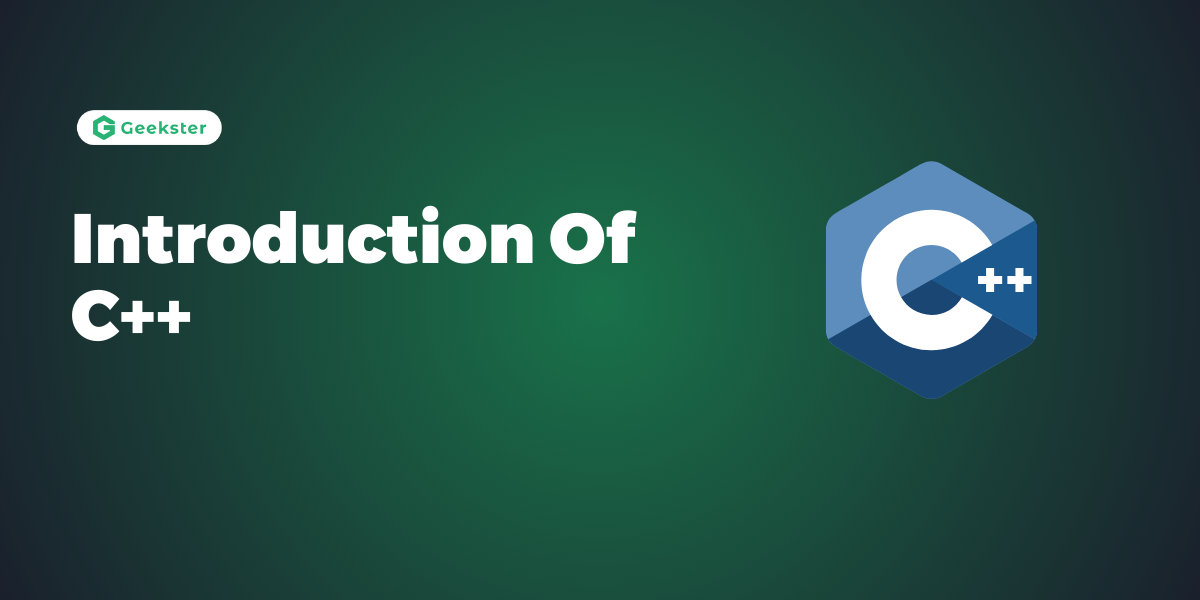The introduction of C++ programming opens doors to a vast array of possibilities, from developing high-performance applications to delving into system-level programming. Whether you’re a beginner or learning to expand your coding knowledge, C++ offers a rich landscape of opportunities.
C++ is a powerful computer programming language renowned for its efficiency, flexibility, and performance. As an extension of the widely-used C language, C++ inherits its low-level capabilities while introducing high-level features like object-oriented programming. This unique blend of capabilities makes C++ a versatile choice for developing a wide range of applications, including system software, games, embedded systems, and more.
C++ syntax is both intuitive and expressive, allowing developers to write concise and readable code. Its extensive standard library provides a lot of functions and utilities, providing developers tools to tackle complex tasks with ease. Additionally, C++’s support for features like templates and generics allows programmers to write highly reusable and efficient code.
This comprehensive guide, introduction of C++, will take you through the history, characteristics, and applications of C++.
History of C++ Programming
C++ traces its origins back to the early 1980s when Danish computer scientist Bjarne Stroustrup began developing it as an extension of the C language. The aim was to enhance C with object-oriented programming capabilities while maintaining compatibility with existing C code. In 1983, Stroustrup officially named the language “C++,” signifying its evolutionary nature.
Since its inception, C++ has undergone several revisions, with each version introducing new features and improvements. The release of C++11 in 2011 marked a significant milestone, introducing modern language features like lambda expressions, range-based for loops, and smart pointers. Subsequent releases, including C++14, C++17, and C++20, have further refined the language, cementing its status as a cornerstone of modern software development.

Overview of C++
C++ is a general-purpose programming language renowned for its performance, efficiency, and versatility. It combines the low-level capabilities of C with high-level features like object-oriented programming, making it suitable for a wide range of applications. C++’s syntax is similar to C, making it easy for developers familiar with C to transition to C++ seamlessly.
One of C++’s defining features is its support for object-oriented programming (OOP), which enables developers to model real-world entities as objects with properties and behaviors. This paradigm promotes code reusability, modularity, and scalability, making it ideal for building large-scale software systems.
Why to choose C++ ?
Choosing C++ as your primary programming language offers numerous benefits:
- Performance: C++ is renowned for its blazing-fast performance, making it ideal for applications where speed is critical, such as games, real-time systems, and high-frequency trading platforms.
- Efficiency: C++ provides fine-grained control over system resources, allowing developers to optimise code for memory usage and execution speed. Its lightweight abstractions enable efficient low-level programming without sacrificing performance.
- Versatility: C++’s versatility extends across a wide range of domains, including system programming, game development, scientific computing, and embedded systems. Its rich standard library and extensive ecosystem of third-party libraries empower developers to tackle diverse challenges with confidence.
- Portability: C++ code can be compiled to run on various platforms, including Windows, Linux, macOS, and embedded systems, ensuring cross-platform compatibility and flexibility.
Applications of C++

C++ finds applications in a different domains, including:
- System Software: C++ is widely used for developing operating systems, device drivers, compilers, and other system-level software due to its efficiency and low-level capabilities.
- Game Development: Many AAA game titles are built using C++ due to its performance, control, and ability to interface with hardware directly.
- Embedded Systems: C++ is commonly used in embedded systems programming for its efficiency, portability, and real-time capabilities.
- High-Performance Computing: C++ is a popular choice for scientific computing, simulations, and parallel processing due to its performance and low-level control.
Conclusion
With C++, sky is just a limit, providing endless programming possibilities. It offers unparalleled performance, efficiency, and versatility. Whether you’re developing high-performance applications, crafting system-level software, or diving into game development, C++ equips you with the tools and capabilities needed to bring your ideas to life. With its rich history, robust features, and extensive applications and a large community, C++ remains a cornerstone of modern software development, continuing to shape the technological landscape for years to come.
Frequently Asked Questions
C++ is an extension of C, so they share many similarities in syntax and basic constructs. However, C++ introduces several new features, such as object-oriented programming, classes, inheritance, function overloading, and templates. C++ also has better memory management and more robust libraries than C.
C++ is widely used for developing system software, games, graphical applications, embedded systems, databases, compilers, and many other types of software. It’s particularly well-suited for applications that require high performance, low-level hardware control, and resource-constrained environments.
Some common challenges for beginners learning C++ and how to overcome them:
1. Pointers and memory management:
Challenge: Understanding pointers, dereferencing, dynamic memory allocation/deallocation.
Solution: Practice with small examples, learn memory management best practices like RAII and smart pointers.
2 Complex syntax and rules:
Challenge: C++ has a steep learning curve with verbose syntax and many features.
Solution: Start with basics, write lots of code, use IDEs with linting tools, follow coding style guides.
3. Object-Oriented Programming (OOP) concepts:
Challenge: Mastering classes, inheritance, polymorphism, and effective OOP design.
Solution: Learn OOP principles through simple examples, practice class design and hierarchies, study design patterns.

